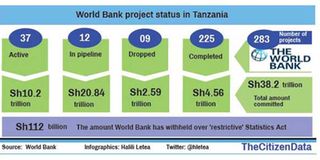World Bank blocks Sh110bn over Statistics Act

What you need to know:
- World Bank is holding up to $50million (equivalent to Sh112billion) for Tanzania in reaction to the East African country’s ‘repressive’ law on statistics.
- This comes at a time when Parliament has just approved new amendments to the 2015 law to criminalise the dissemination or otherwise communication to the public any statistical information which is intended to invalidate, distort or discredit official statistics.
- WB holds Sh112 billion for TZ over the Statistics Act
Dar es Salaam. The World Bank is holding up to $50 million (equivalent to Sh112 billion) meant for Tanzania, saying it is deeply concerned about restrictions that the government has placed on freedom of speech concerning statistics.
But the permanent secretary in the ministry of Finance and Planning, Mr Doto James, said he was not aware of the existence of such funds.
“The government has neither requested nor embarked on a process to ask for a $50 million loan from the World Bank for use by the National Bureau of Statistics. As permanent secretary, I can confirm that we have never written to the World Bank asking for the money,” he told The Citizen’s sister paper, Mwananchi, by telephone.
The $50 million grant was intended to support government statistical activities in Tanzania but the latest reports indicate that this support may have to wait longer.
The WB says it is in “discussions with the government of Tanzania on whether further support to building sustainable statistical systems is appropriate at this time.”
The new development comes at a time when Parliament has just approved new amendments to the contentious Statistics Act 2015 during its September 2018 sessions. The new amendments to the Statistics Act, Cap 351, will among others criminalise the dissemination or otherwise communication to the public any statistical information which is intended to invalidate, distort or discredit official statistics.
The amendments, moved in the House by the Attorney General, Dr Adelardus Kilangi, last month also maintains barring people or institutions from seeking the approval of the National Bureau of Statistics (NBS) prior to communicating their research findings to the public.
The amendment received mixed reactions from a section of MPs, with the opposition Constitutional and Legal Affairs spokesperson, Mr Ally Saleh, saying the amendments were meant to limit the freedom of institutions and individuals involved in collecting, analysing and disseminating statistical information for survey and non-survey activities.
However, Parliamentary Constitution and Legal Affairs Committee chairman Mohamed Mchengerwa said the amendments were meant to ensure that all disseminated data were authentic and not distorted.
NBS Information officer Said Amir told The Citizen that he would follow up with the bureau’s authorities over the matter.
The World Bank on Monday, said it had shared its concerns with the Tanzanian government and was in discussions with officials about a new Act.
The WB was responding to a query raised by Eye on Global Transparency on its online platform, www.eyeonglobaltransparency.net, whereby the bank is reported to have said the law was “out of line with international standards such as the UN Fundamental Principles of Official Statistics and the African Charter on Statistics.”
World Bank Tanzania Communications officer Loy Nabeta confirmed to The Citizen that what was reported by the Eye on Global Transparency was indeed authentic.
WB was quoted as saying: “We have shared our concerns with the Tanzanian authorities that the amendments, if implemented, could have serious impacts on the generation and use of official and non-official statistics, which are a vital foundation for the country’s development.”
According to the amended law, dissemination of “any statistical information, which is intended to invalidate, distort or discredit official statistics is an offence and receives a punishment of $6,000 fine or a three-year prison sentence.”
Statistics stakeholders in Tanzania have also said the proposed amendment would severely limit the freedom of institutions and individuals involved in collecting, analysing and disseminating statistical information for survey and non-survey activities.
Kigoma Urban MP (ACT-Wazalendo) Zitto Kabwe said the proposed amendment would curtail the statistical freedom enjoyed by various institutions in Tanzania – including totally prohibiting independent data interpretation.
Mr Kabwe said if everyone with statistical data must seek NBS approval, this indicates that if the government is not satisfied with research findings by an individual or institution then almost automatically, NBS will not approve dissemination of the findings.




